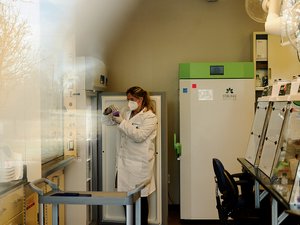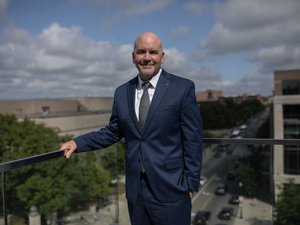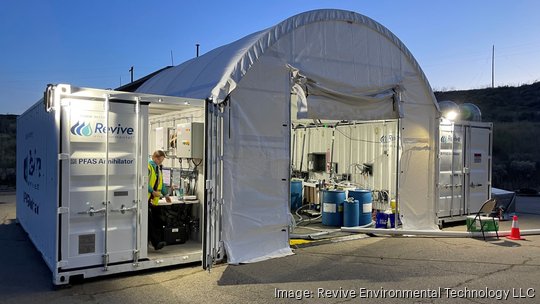
New water pollution rules to limit so-called "forever chemicals" in drinking water could supercharge business for an already fast-growing Battelle spinout.
The PFAS Annihilator by Columbus-based Revive Environmental Technology LLC is the first product that meets all the criteria for emerging technologies that will be allowed to compete with storage or incineration for getting rid of the pollutant, Revive CEO David Trueba said. The U.S. EPA released the criteria while setting nationwide standards for testing and removing the pollutant called PFAS from drinking water supplies.
"We're in a race to get over the 'valley of death' for new technology – we've gotten there over the last year," Trueba said in an interview. "Revive is not only competitive with (incineration); we’re also more effective at containing the PFAS and completely destroying it."
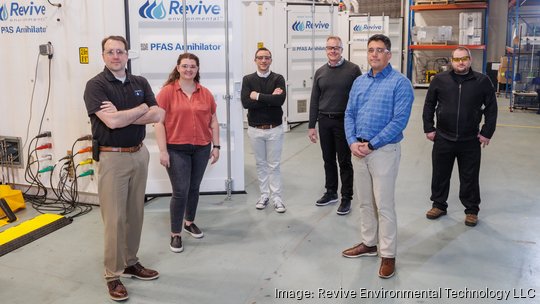
Common in nonstick coatings, water repellants and fire suppression foam, PFAS chemicals were discovered to be possible carcinogens. Their chains of carbon and fluorine – the strongest chemical bond in nature – don’t degrade on their own, hence the name “forever chemicals.”
Revive spun out of Battelle last January and launched commercially in May. Viking Global Investors, a Connecticut firm that focuses on healthcare and environmental technology, invested an undisclosed sum for an undisclosed stake to launch the business. This was the third Battelle-Viking partnership to spin out a technology invented at the Columbus research giant.
Various public and private clients in Michigan have used Annihilator to treat leachate from landfills and stockpiles of fire suppression foam. The states of Ohio and New Hampshire have used the system in programs for fire departments to turn in stockpiles of foam for destruction.
Revive incubated so far in Battelle and takes the mobile system to clients, housed in two shipping containers. This spring the company plans to open a permanent site, including office and laboratory, on the far west side of Columbus, operating three Annihilator systems. With 15 employees today, the company will more than double, with most of the jobs in Columbus.
"We do want Ohio to win," Trueba said. "That's why we're here and why we're building a facility."
Over the past five years, Battelle developed and refined the first system that reliably and economically destroys these chemicals – akin to a gigantic high-tech pressure cooker. Contaminated liquid or foam goes in; deionized water and salts come out.
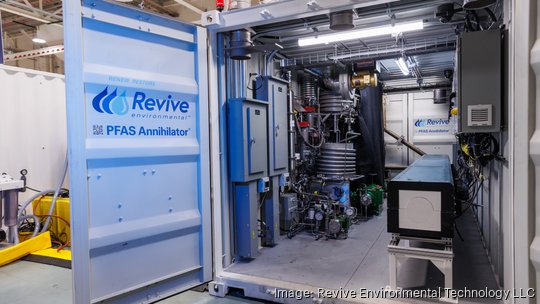
Revive's other main product removes PFAS that collects in carbon filters at water plants. Instead of heading to a toxic waste landfill, the contaminant is destroyed and the carbon can be reused.
Meanwhile, treating landfill leachate, foam and other sources of PFAS will keep the pollutant from entering water plants in the first place, Trueba said.
"We're breaking the cycle," he said.
Revenue is not released, but bookings at the start of this year are fivefold what they were at launch, he said. Business in Michigan "has exploded," and Revive is in talks with potential customers throughout the Midwest, New England and Southwest.
Revive also works alongside Battelle as a subcontractor, as with the state of Ohio. Battelle's labs evaluate levels and sources of the contaminants, and measure their presence in air and groundwater. Revive's Annihilator then does the destruction.
"Battelle has been supporting clients across the life cycle for almost two decades," Shalene Thomas, senior emerging contaminants program manager for Battelle, said in a statement. "We strive to lead with applied research and development to provide the best-available science and technology for society’s biggest chemical challenges."
The new federal standards require testing of public water supplies and set limits on the amount of PFAS allowed. The administration is also providing $1 billion in funding from the Bipartisan Infrastructure Law to help implement testing and help owners of private wells treat contamination.
"Every public (water) utility in America needs to adhere to that standard in the next five years," Trueba said. "We will become busier because of that.
"It will significantly accelerate people who were on the fence," he said. "There's a lot of people who weren’t testing, because they knew once they tested they’d have a problem and have to act."
Revive was among the first startups seeking to disrupt the existing, imperfect methods for dealing with PFAS in the past: simply storing it, putting it in landfills, or incineration.
Other technologies have launched over the past year, but Trueba said Revive is the only one with internal and third-party testing to confirm its system destroys all of the contaminant treated, while also able to operate at large scale. Annihilator can compete on price with incinerators, he said, while not releasing any harmful emissions. One of the EPA criteria is impact to vulnerable communities.
"Battelle, when they spun out Revive, set us up very well," Trueba said. "They wanted to have an operating business once the regulations came out like they did this week."
